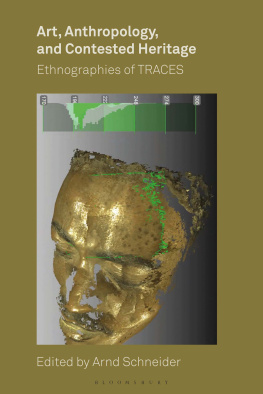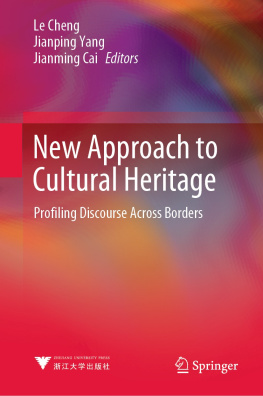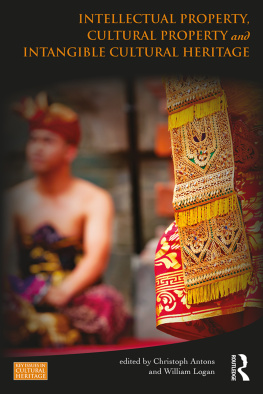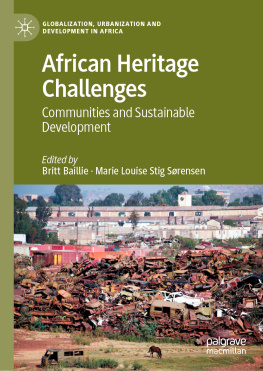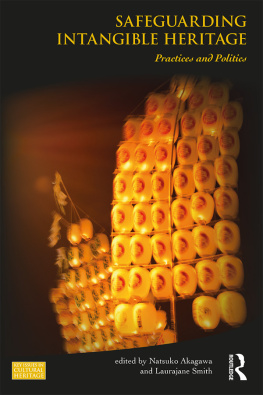
Art, Anthropology, and
Contested Heritage
Also available from Bloomsbury
Alternative Art and Anthropology, edited by Arnd Schneider
Experimental Film and Anthropology, edited by Arnd Schneider and Caterina Pasqualino
Practicing Art and Anthropology, Anna Laine

Contents
Every reasonable effort has been made to trace and acknowledge the ownership of copyrighted material (including illustrations) included in this book. Any errors that may have occurred are inadvertent and will be corrected in subsequent editions, provided notification is sent to the editor.
Tal Adler is an artist and researcher at the Centre for Anthropological Research on Heritage and Museums at the Humboldt University of Berlin. For the TRACES project, he developed long-term creative co-productions between artists, researchers, and institutions for creating meaningful and sustainable ways to disseminate contentious cultural heritages. Between 2011 and 2016 he worked at the Academy of Fine Arts in Vienna, conducting artistic research on the politics of memory and display, concentrating on difficult heritage at marginal and established museums, landscapes, sites of commemoration, and civil society organizations in Austria. For over two decades he has been developing methods of collaborative artistic research for engaging with difficult pasts and conflicted communities in Israel/Palestine and in Europe.
Rzvan Anton is a visual artist based in Cluj, Romania. He is currently teaching at the University of Art and Design and is a member of the Paintbrush Factory artist collective. Some of his more recent exhibitions are but we brought it back : Objects, Paths, Stories, curators: Julie Dawson, Alexandra Toma and Rzvan Anton, Casa de lng Sinagog, Media (2018); Objects in the mirror are closer than they appear, Eastwards Prospectus, Bucharest (2018), Life a Users Manual: I work, therefore Im not, curators: Ami Barak and Diana Marincu, Art Encounters, Timioara (2017), Future of Memory, Casa Tranzit, curator: Olga tefan, Cluj (2017), The Factory of Facts and Other (Unspoken) Stories, curator: Alina erban, Domino, Cluj (2016). Artist in residence at Media Jewish Archives between 2016 and 2018 as part of Absence as Heritage project (TRACES) and at Museums Quartier, Vienna in November 2018.
Bla Baji received his PhD (2017) in cultural anthropology at the University of Ljubljana. In his dissertation, based on long-term ethnographic fieldwork in Ljubljana, Baji discussed recreational running as an aesthetic practice, rooted in late capitalist dynamic. Since 2017, he has been employed as a postdoctoral researcher in Cultural Studies in the SENSOTRA research project at the University of Eastern Finland. His key research interests are anthropology of space and place, anthropology of the senses, anthropology of art, popular culture, and memory studies, as well as epistemological and theoretical underpinnings of these areas. He is also the current president of the Slovenian ethnological and anthropological association, KULA. For TRACES Baji worked as an embedded ethnographer in the creative co-production Casting of Death.
Matei Bellu is an artist and writer with a background in architecture and anthropology. In his research-based practice he explores the constructions of hegemonial realities. More often than not he collaborates with his sister Andrea Bellu.
Leone Contini studied Philosophy and Cultural Anthropology at Siena University. His research, on the edge between ethnography and art, is focused on intercultural frictions, conflict and power relations. His media include installations, lecture-performances, interventions in public space, writing, drawing, and audio-visual narratives. He exhibited or held interventions at Manifesta 12, Palermo, 2018; Pigorini Museum, Rome, 2017; GAM, Turin, 2017; Mudec, Milan, 2017; Quadriennale, Rome, 2016; Cittadellarte, Biella, 2016; D-0 Ark Underground Biennial, Bosnia, 2015; Delfina Foundation, London, 2017, 2015, 2014; MART, Rovereto, 2015; Galleria Civica, Trento, 2014; Khoj, New Delhi, 2014; Kunstraum, Munich, 2014; Villa Romana, Florence, 2014; DOCVA, Milano, 2014 and 2015; Kunstverein, Amsterdam 2013; Tirana Art Lab, Tirana, 2013; Pecci Museum, Prato, 2012. He took part in the following residencies: Akademie Schloss Solitude, Stuttgart; CittadellarteFondazione Pistoletto in Biella, Italy; Delfina Foundation, London, UK; Kronika, Bytom, Poland; Khoj, New Delhi, India. Leone lives and works in Tuscany, Italy.
Julie Dawson is a researcher at the Leo Baeck Institute and directs their Jewish Bukovina and Transylvania project, a long-term survey of archival records related to Jewish history in Transylvania and Bukovina (jbat.lbi.org). She has been involved with preservation and heritage activities at the Media synagogue (Transylvania) since 2008. In the context of the EU Horizons 2020 project TRACES: Transmitting Contentious Cultural Heritages with the Arts she acted as researcher in the Media team, developing material with artist Rzvan Anton for the exhibition Liminal Portraits: Stories from the Margins (2017) and the oral history project and exhibition but we brought it back : Objects, Paths, Stories (2018) at the multi-functional arts and cultural space, Casa de lng Sinagog (house next to the synagogue) in Media. Ms. Dawson is writing her PhD at the Institute for Contemporary History of the University of Vienna on post-war diaries found in the Media synagogue.
The Domestic Research Society is a curatorial and artistic collective based in Slovenia. It was established by Damijan Kracina, Alenka Pirman, and Jani Pirnat in 2004 to record, collect, research, and present domestic phenomena. They conduct collaborative and interdisciplinary research, which enables the development of innovative approaches in contemporary art, actually addressing a broader audience. Jani Pirnat, art historian, is employed as a contemporary art curator in the Museum and Galleries of Ljubljana. Alenka Pirman is a contemporary artist and PhD student of Heritology at the University of Ljubljana. Since 1991 she has collaborated with various heritage institutions, including police museums. Damijan Kracina is a sculptor, media artist, and teacher. Beside his prolific artistic career he teaches at the School for Design and Photography in Ljubljana. http://www.ddr.si/
John Harries received his PhD from the University of Edinburgh in 2002, where he is a senior teaching fellow in Social Anthropology. His research concerns the memory and materiality with particular reference to contemporary politics of identity in settler colonial societies. He explores these issues through an ongoing ethnographic study into the ways in which the Beothuk, a thought-to-be-extinct First Nations people, are remembered in Newfoundland, Canada. In the context of this work, he has become increasingly interested in the affective presence and emotive materiality of human remains, as well as other things and substances (stones, blood, etc.) that are enrolled into the ways in which we materialize the presence of the past. He is also involved in the TRACES project, which investigates the challenges and opportunities raised when transmitting complex pasts and the role the arts in engaging with the difficult heritage in contemporary Europe.
Aglaja Kempinski received her PhD in Social Anthropology from the University of Edinburgh in 2019 after completing her MA at SOAS. Her PhD investigated how the Ju|hoansi of Namibia (otherwise known as San or Bushmen and commonly romanticized, considered stand-ins for stone age hunter gatherers, or reduced to the status of an impoverished minority) inhabit the varied and often contradictory images of themselves they are confronted with by tourists, researchers, filmmakers, and NGOs. Being a trained filmmaker herself, Aglaja uses collaborative film and a holistic image-based approach to consider the role of images in terms of environment, social technique, strategic product, and ways of making sense of the world. Her interests, besides all image-based anthropology, include indigeneity, development, paganism, and the exploration of multiplicities.
Next page
